As a display of political activism in difficult circumstances, it looks very noble: in the midst of grim weather, a dozen or so members of the Green party, gathered around a street stall in the middle of Bristol, doing their best to make the case for a £10 minimum wage by communing with people whose main priority is to get back indoors, as quickly as possible.
Every now and again, however, someone stops for a chat. James Collins, 25, is working as a court usher for £7.50 an hour, and is returning to work clutching a baked potato in a plastic box. With no prompting, he lets rip about the Greens’ exclusion – so far, anyway – from plans for next year’s televised election debates. “I’m just annoyed that Ukip are included, and they’re not,” he says. “The Greens got an MP ages ago, didn’t they? And it wasn’t even in a byelection. The whole thing’s a joke.”
Jess Fawkes, 47, is a mental health support worker, and a fan of her local Green councillors’ political style. “They do things in a way that appeals more to women,” she says. “They kind of stand up for their principles, but in a non-confrontational way.” Unfortunately, she says she’ll vote Labour next May.
And then comes Nick Martin, 21, tugging on a roll-up in between the shifts at a local pub that punctuate his life as a music student. “I don’t really follow politics,” he says. “But when I do vote, I vote Green. They’re more environmental, aren’t they? And they stand up for working people.”
That’s what Labour claim to do, I suggest.
“Well, they say they do. But they’ve got a rich people kind of vibe, haven’t they?”
These three all live in the urban constituency of Bristol West – currently held by the Liberal Democrats and coveted by Labour, but now talked up by the Greens as a possible win next May. In this year’s local elections, the Greens got the most votes within the seat, finishing two percentage points ahead of Labour, and suggesting that Bristol West could now be a three-way marginal. Now, five out of six of Bristol’s Green city councillors represent wards in the constituency, and its educated, student-heavy demographics suggest that if another Green candidate for Westminster is to match the success of Caroline Lucas in Brighton – where the Greens also run the city council – it may well happen here.
The party already has other pockets of support and activism in a diverse array of places, from Liverpool and Lancaster to Solihull and Oxford. But it now claims to be in the midst of what its PR blurb calls “the Green surge”. Membership is up 57% since January to 22,000. In polling released this week by the Tory grandee Michael Ashcroft, the Greens were on 8%, overtaking the Lib Dems for the first time in a decade; in September, an Ipsos/Mori survey suggested that 43% of people “might vote” for the party. When the news broke of the Greens’ exclusion from plans for next year’s TV debates, the next 36 hours saw 150,000 people put their names to a protest petition on change.org.
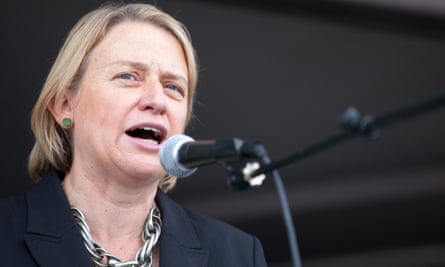
The Greens claim – not unreasonably – that all of this represents something very significant. Self-evidently, it is of a piece with the ongoing fragmentation of British politics that has also played into the rise of Ukip. And as if to confirm that something is afoot, last week came very interesting news: that Labour had appointed the shadow justice secretary Sadiq Khan to try to persuade Labour voters tempted by the Greens to stay put.
“At the moment, we’re a snowball that’s turning over fairly slowly,” says the Greens’ leader, Natalie Bennett. “But with a bit of a push, and a bit more airtime, a bit more space in the newspapers and a bit more chance for people to see what we stand for, that snowball will start to roll pretty fast.”
As far as new convers are concerned, Bennett mentions disaffection among former Lib Dem supporters, and the fact that the Labour vote is “basically very soft – a lot of people are unhappy with a Labour party that, in practice if not in rhetoric, is barely distinguishable from the Tories”. She also says that a smattering of former Conservatives have come her party’s way, dismayed by fracking and what is happening to the green belt.
There is one more issue at work, she says, bound up with the party that is surely the Greens’ polar opposite. “This is anecdotal, but I’ve heard a lot of people saying, ‘I haven’t voted for ages, decades – ever. And I don’t really believe in party politics. But if Ukip are on the rise, I’ve got to support you as the anti-Ukip party.’”
This aspect of the story might also have a geographical dimension. As demonstrated by Ukip’s victory in the Clacton byelection, the prospect of them winning in Rochester and Strood and their strong presence on a string of county councils, the heartlands of Nigel Farage’s party are concentrated in the English east. The Greens’ successes in Bristol, by contrast, point up the rather different situation in the south-west. Some of the relevant numbers highlight the point: in Bristol, Somerset, Dorset, Devon and Cornwall combined, for example, Ukip has fewer city and county councillors that it does in Lincolnshire alone. And by way of proving that the culture and politics of the south-west are very different, this region of England contains famously strong redoubts of environmentalism, grassroots activism and new kinds of political participation.
All this can easily be inflated into an romantic ideal that rather neglects the post-industrial condition of many West Country towns and cities, and the problems that come with it. The picture is also complicated by a few political developments that run counter to the basic theory of an east/west divide: Ukip’s recent strong showing in Plymouth; the Greens’ solid base in Norwich; the rather inconvenient fact that, though the Greens finished strongly enough in the south-west’s European elections to gain their first MEP outside the south-east, Ukip still topped the poll.
The essential idea, though, holds true: the south-west really is different from the east, and a lot of people here are doing refreshingly different things, many of which chime with the Greens’ essential outlook. This picture definitely applies to such towns as Totnes in Devon (birthplace of the Transition Towns movement), Stroud in Gloucestershire, Frome in Somerset – where a town council taken over by independents has come up with a toolkit for people that might want to do the same, under the banner of “flatpack democracy” – and St Ives, a constituency the Greens say they are taking increasingly seriously.
With some exceptions, Labour’s performance in large swathes of the south-west tends to be underwhelming: until the Lib Dems went into partnership with the Tories, politics was largely carved up between those two parties. Now, though, with the Lib Dems tanking and an obvious gap in the political market, there seems to be a revival of the kind of rebellious instincts that have often defined the south-west’s history – something seen in its penchant for non-conformist Christianity, 17th-century risings against enclosures and deforestation, the Tolpuddle martyrs, the 1831 Bristol riotsthat erupted as a reaction to the failure of parliamentary reform – and more recently, the 2011 disturbances in the same city focused on a new Tesco store in the famously countercultural neighbourhood of Stokes Croft.
This brings us to the place that surely represents the south-western spirit’s wellspring. Bristol is the home not just of a thriving Green party, but such campaigning organisations as the Soil Association and the green-leaning transport group SusTrans. Its singular identity was recently highlighted by the fact that it was the only one of 11 English cities to place its affairs in the hands of an elected mayor, and that it then gave the job to a green-inclined independent, George Ferguson.
The Greens’ candidate in Bristol West is 45-year-old Darren Hall, who co-directs an annual series of events in the city called Big Green Week. His backstory goes against the usual Green stereotypes, to say the least. A one-time engineer in the RAF, he then worked for British Aerospace, before spending 10 years as a Home Office civil servant, focused on crime and drugs. During his time there, he was seconded to work for Bristol city council, and he eventually led a successful bid for the city to become 2015’s official European Green capital, only to take issue with the way the plans were then made the responsibility of a specially formed private company.
“At that point,” he tells me, “I was so pissed off about what happened that I thought, ‘Fuck it – I’m going to go into politics.’ And I joined the Green party two days later.” This all happened just six months ago: when I talk to him in the deeply Bristolian surroundings of a cafe underneath the city’s renowned independent record shop Rise, I get the clear sense that his subsequent elevation to the status of a great parliamentary hope initially took him by surprise. “All of a sudden, we went from three to five councillors, and overnight it became this really winnable seat,” he says. “How did I feel? Oh, scared. But excited.”
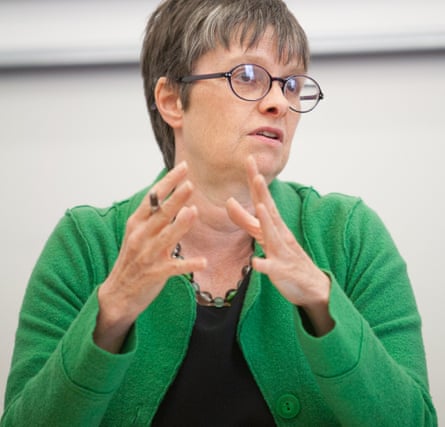
What does he think defines this part of the country? “I know it sounds a bit hokey, but we’re closer to nature. It’s a very rural environment here, and your ability to get to the beach, or the Mendip Hills, or wherever – that’s really important. We haven’t had big industry here: people have farmed, or made things. And people drift here; when they say, ‘I reject the consumerist society’, they come to the south-west.”
The Greens’ south-west MEP is Molly Scott Cato, who is originally from Bath, but moved to Stroud six years ago. Back in May, she tells me, the 166,417 votes that put her ahead of the Lib Dems were pieced together from no end of different places: she received 20% of the vote in Bristol (“which was extraordinary”), and also did very well in Cornwall. She is not the first person to mention Labour’s weaknesses in the south-west, and the Lib Dems’ collapse. “But culturally,” she goes on, “there is also a way in which the south-west is leading into the future. People often think the Green vote is a middle-classy, animal welfare-ish, human-rights kind of vote, like in Brighton. My perception of the south-west is that it’s quite a different phenomenon – much more about quality of life, and a different relationship with the environment, and strong communities, and thinking about what wealth means in a different way.”
Her part of the country, she says, contains “places where you get the feeling that people have got out of the rat race – creative people trying to do things in a different way … it’s almost like a new way of living, and I think the south-west is ahead in developing it.”
Back at the street stall in Bristol, I leave Darren Hall wondering about what might happen next year. “For another Green MP to come along and add more to that voice that says, ‘Come on – let’s do things differently’ – it’s a huge prize,” he tells me. And then he’s gone, pressing more leaflets and newspapers on to passersby, enthusiastically explaining what his party is all about, trying to make the Greens’ snowball roll that bit faster.
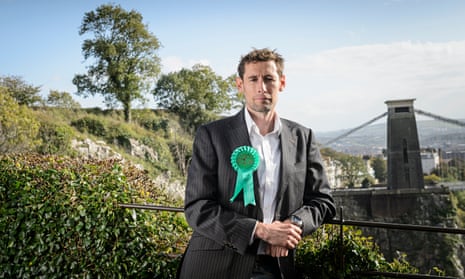


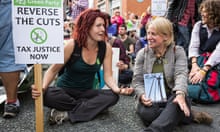
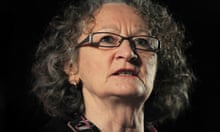
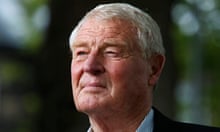

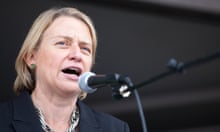

Comments (…)
Sign in or create your Guardian account to join the discussion